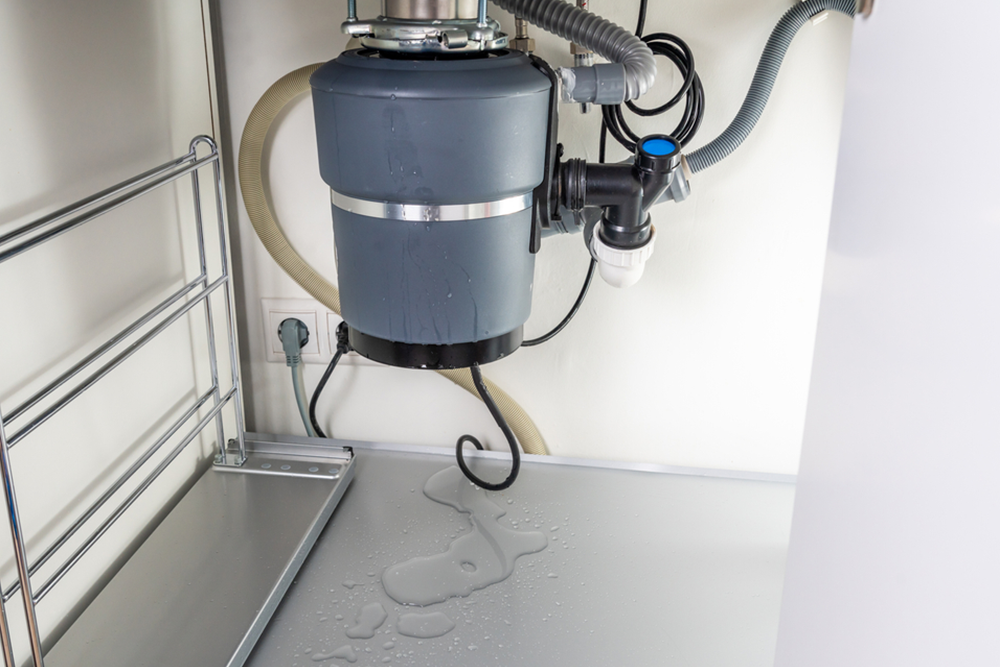Helpful Techniques for Repairing a Dripping Garbage Disposal
Helpful Techniques for Repairing a Dripping Garbage Disposal
Blog Article
Just how do you really feel with regards to The Handy Guide To Fixing Your Garbage Disposal Leaking?

Garbage disposals are important cooking area home appliances that help in throwing away food waste efficiently. Nevertheless, a dripping garbage disposal can be an irritating and messy problem to manage. Thankfully, numerous leaks can be dealt with easily with a couple of simple actions. In this post, we will certainly review exactly how to deal with a dripping garbage disposal successfully.
Intro
Waste disposal unit are installed under kitchen sinks and are created to shred food waste into smaller items, enabling it to pass through the pipes system conveniently. While these devices are usually reliable, leakages can happen over time because of deterioration, loosened connections, or damages to the system.
Step-by-Step Overview to Repairing a Leaking Garbage Disposal
Switch off the Power
Prior to trying any kind of repairs, ensure that the power to the waste disposal unit device is shut off to avoid the danger of electric shock.
Find the Leak
Determine the exact location of the leak and determine the reason
Tighten up Connections
Use a wrench to tighten any type of loosened links in between the disposal system and the pipes system.
Change Seals or Gaskets
If the leakage is due to worn seals or gaskets, remove the old components and replace them with brand-new ones.
Patching Fractures or Openings
For fractures or openings in the disposal system, use epoxy or an ideal patching product to seal the broken area.
Recognizing the Source of the Leakage
Before attempting to fix a leaking garbage disposal, it is necessary to recognize the source of the leak. This can typically be done with aesthetic examination or by carrying out basic examinations.
Visual Inspection
Evaluate the garbage disposal unit very carefully for any kind of indicators of water leak. Pay attention to locations around seals, gaskets, and connection factors.
Examining for Leaks
One way to evaluate for leaks is by running water through the disposal device and checking for any type of visible indications of leakage.
Common Reasons For Leaks in Trash Disposals
Worn Seals and Gaskets
Seals and gaskets play a critical duty in stopping water from leaking out of the waste disposal unit. Gradually, these components can wear away, causing leaks around the disposal system.
Loose Links
The connections in between the garbage disposal and the plumbing system can come to be loose gradually, creating water to leak out during operation.
Splits or Openings in the Disposal Unit
Physical damage to the waste disposal unit, such as splits or holes in the housing, can also lead to leakages.
Tools and Materials Needed for Repairing a Leaking Waste Disposal Unit
Prior to starting the fixing procedure, collect the essential devices and materials, consisting of a screwdriver, flexible wrench, plumber's putty, replacement seals or gaskets, and epoxy or patching material for fixing splits or openings.
Checking the Garbage Disposal After Repair Work
When the repair work is complete, examine the waste disposal unit by running water with it to ensure that the leakage has been dealt with.
Preventive Maintenance Tips to Prevent Future Leaks
To prevent future leakages, it is necessary to carry out normal upkeep on your garbage disposal. This consists of keeping it tidy, avoiding putting non-food things or hard items down the disposal, and periodically checking for leakages or various other issues.
Final thought
Finally, taking care of a dripping garbage disposal is a fairly uncomplicated process that can be completed with fundamental devices and products. By adhering to the actions outlined in this short article and practicing preventative upkeep, you can maintain your waste disposal unit in good working condition and avoid costly repair work in the future.
HERE’S HOW TO FIX YOUR GARBAGE DISPOSAL
WHAT TO DO IF SOMETHING IS STUCK IN YOUR GARBAGE DISPOSAL
If the impeller won’t turn, there’s probably something stuck in the disposal. It could be a steak bone or peach pit, although plumbers report pulling all sorts of inappropriate objects out of disposals, such as bottle caps or aluminum foil. Make sure power to the disposal is off, and look inside to see if you can see the source of the jam.
Never stick your fingers in a disposal. Pull out anything you see with tongs or pliers.
If the disposal still won’t work, it may be time to call a plumber or consider buying a new disposal. GEM Plumbing & Heating is here for all of your garbage disposal needs.
WHAT TO DO IF YOUR GARBAGE DISPOSAL DRAIN IS CLOGGED
Take everything out from underneath your sink and put a bucket or other container under your disposal to catch any water that drains out. Disconnect your disposal from the power supply. If it’s plugged into a wall outlet, unplug it. If it’s hardwired into an electrical box, go to the electrical panel and turn off the breaker for the disposal. Pour ¼ cup of baking soda into the drain, followed by ½ cup of white vinegar. Give the solution a few minutes to fizz and do its work. Look into the disposal with a flashlight to see if you can see an object that might be causing the clog. If you see it, remove it using tongs or pliers. MORE TIPS ON DEALING WITH A CLOGGED GARBAGE DISPOSAL
Never use drain cleaner in a garbage disposal. It can damage the plastic parts inside the disposal. You can also be splashed with the caustic liquid while working to clear the clog. Beware! Never stick your fingers into a garbage disposal. Trust us — not a good idea. In many instances, your dishwasher drains through your garbage disposal. This allows the disposal to grind any large food particles that may be drained out of your dishwasher. There are some jurisdictions, however, where the plumbing code prohibits such a connection. WHAT TO DO WHEN YOUR DISHWASHER DRAINS THROUGH THE DISPOSAL
Run some water in the sink so your plunger has at least a ½-inch of water to create a seal and plunge vigorously up and down several times. You may need to repeat this several times. Run hot water down the drain to clear any residue that remains.

As a fervent reader on Why Is , I figured sharing that piece of content was a good idea. If you liked our blog post if you please make sure you remember to share it. I am grateful for your time. Visit us again soon.
Call Today Report this page